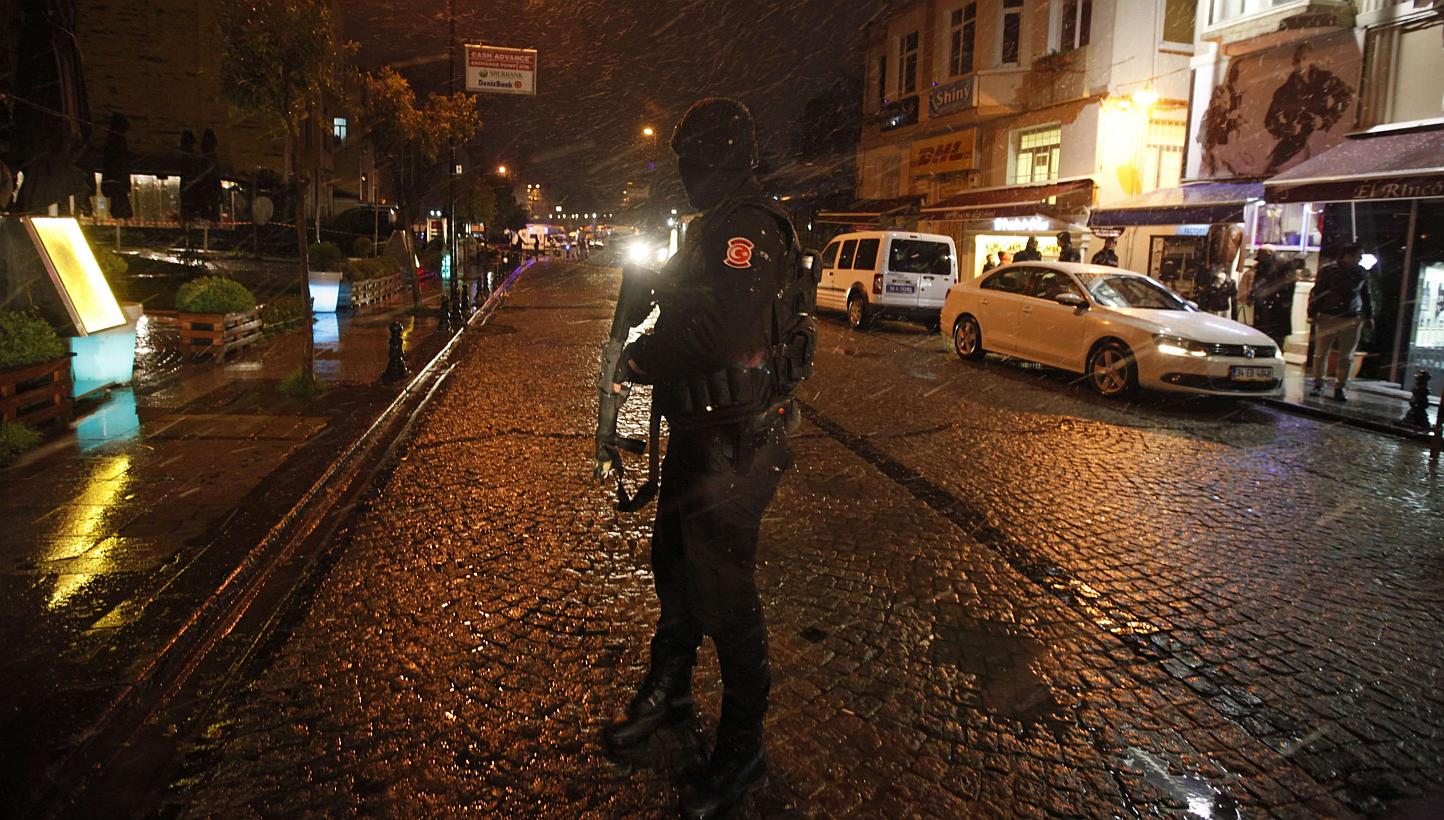Marxist group claims suicide attack on Istanbul tourist hub
Sign up now: Get ST's newsletters delivered to your inbox

A police officer stands guard at the scene of a bomb blast in Istanbul Jan 6, 2015. An outlawed Turkish Marxist group on Wednesday claimed a strike by a female suicide bomber in the heart of Istanbul's tourist district, raising fears of a wave of attacks one week after its militants hit police guarding a palace in the city. -- PHOTO: REUTERS
ISTANBUL (AFP) - An outlawed Turkish Marxist group on Wednesday claimed a strike by a female suicide bomber in the heart of Istanbul's tourist district, raising fears of a wave of attacks one week after its militants hit police guarding a palace in the city.
The bomber, a young woman in her 20s, killed herself and a policeman on Tuesday after walking into the police station in Istanbul's Sultanahmet district, home to the city's greatest concentration of historical monuments.
Posing as a tourist who had lost her wallet, she blew herself up after police shot her in the leg when they became suspicious, officials said. One other police officer was slightly injured.
The Marxist Revolutionary People's Liberation Party-Front (DHKP-C) said in a statement on its website: "Our sacrificial fighter... carried out the sacrificial action on the tourist police department in Sultanahmet".
Sultanahmet is home to some of Turkey's top attractions including the Hagia Sophia museum and the Blue Mosque and is thronged by thousands of tourists each day.
The DHKP-C - a radical Marxist organisation considered a terrorist group by Turkey, the European Union and the United States - had also last week claimed a Jan 1 attempted grenade attack on police guarding the Dolmabahce palace in Istanbul that caused no serious casualties.
It said Tuesday's bombing was aimed at "bringing to account" the ruling Justice and Development Party (AKP) co-founded by President Recep Tayyip Erdogan over corruption following a ruling the day earlier that four former ministers accused of graft will not stand trial.
As after the Jan 1 attack, the DHKP-C also said the bombing was a reprisal for the death of Berkin Elvan, a teenager who died in March 2014 after spending 269 days in a coma due to injuries inflicted by the police in the mass anti-government protests of 2013.
"It (the attack) happened because the four former ministers, the thieves, escaped prosecution. It happened because nothing has been done to bring justice for Berkin," the group said.
"We will continue to resist, fight and attack. We will take up arms and attack. Wait and see."
PREVENTED HIGHER TOLL
The DHKP-C named the suicide attacker as Elif Sultan Kalsen, who according to Turkish media was a woman her mid-20s and an active member of the group.
The dead policeman, named as Kenan Kumas, was a former physics teacher from the Black Sea city of Trabzon who had been working for the Istanbul police for five years.
Turkish media said his wife only two months ago had given birth to a daughter, who like the bomber was also called Elif.
Prime Minister Ahmet Davutoglu praised the police Tuesday, saying their bravery had prevented an even higher death toll.
The female bomber was carrying two more charges that did not go off and were later detonated in controlled blasts by bomb disposal experts.
Erdogan expressed outrage at the attack, suggesting the militants could have been seeking to undermine Turkey's tourism industry.
"Was it done to prove that it is not a safe area?" he said in a televised speech.
"What are you trying to achieve? Do you think you will be able to impose your ideologies on our country by doing this? No."
The EU said in a statement it stood with Turkey over the "appalling act of terrorism".
The DHKP-C in the 1980s and 1990s carried out a string of targeted assassinations aimed at foreigners and Turkish security personnel.
But in recent years is has turned to suicide bombings. It claimed a suicide bombing in February 2013 at the US embassy in Ankara where a security guard was killed.
Security has been high in Turkey over the past few months, amid fears of attacks by Kurdish militants and Islamic extremists who have attacked swathes of Iraq and Syria.

